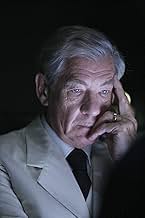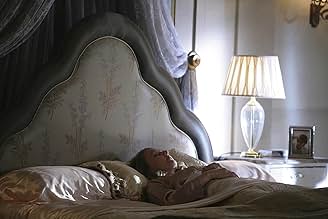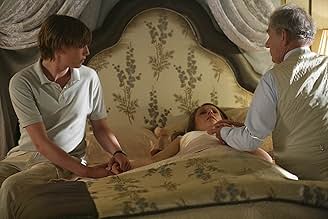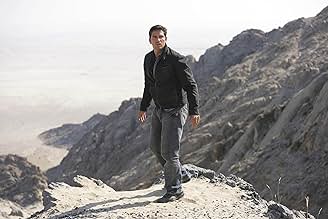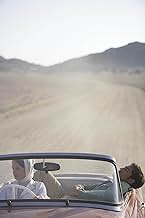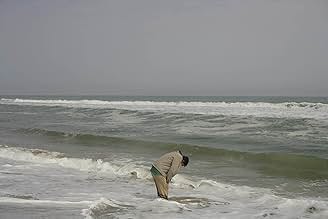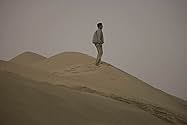The Prisoner
- Mini serie TV
- 2009
- 45min
VALUTAZIONE IMDb
6,1/10
8138
LA TUA VALUTAZIONE
Un agente governativo viene rapito e si ritrova in un'isola misteriosa chiamata "Il Villaggio", dove gli abitanti sono identificati solo da numeri e nessuno può fuggire.Un agente governativo viene rapito e si ritrova in un'isola misteriosa chiamata "Il Villaggio", dove gli abitanti sono identificati solo da numeri e nessuno può fuggire.Un agente governativo viene rapito e si ritrova in un'isola misteriosa chiamata "Il Villaggio", dove gli abitanti sono identificati solo da numeri e nessuno può fuggire.
- Candidato a 2 Primetime Emmy
- 10 candidature totali
Sfoglia gli episodi
Recensioni in evidenza
As a fan of the original Prisoner I can't begin to say how incredibly disappointed I am with this "remake". The "plot" is non-existent and makes no sense. It might be good if it had characters that made kept your interest in spite of the unintelligible plot line but sadly there isn't a single character that makes me care about what happens to them. In the original Patrick McGoohan was an excellent actor and portrayed an engaging character. The character of 6 in the original embodied the admirable quality of not giving up in spite of the odds. He was direct, smart and capable. In contrast, this 6 is a confused mamby-pamby guy with the personality of a doorstop. I am especially disappointed that one of my favorite actors, Ian McKellen would agree to appear in this mess. I think Patrick McGoohan is turning over in his grave.
A man resigns from a mysterious agency. Soon, he finds himself in a place known only as "the Village" where nobody has a name but is a number where he's re-dubbed Six by its leader a man known only as Two. Resisting Two's attempts to break his mind with his insistence "I am not a number, I am a free man," Six begins trying to escape while trying to piece together what and where the Village really is. That, in short, is the premise of the six episode miniseries re-imaging of the classic 1967 Patrick McGoohan TV series The Prisoner. The Prisoner is an intriguing psychological thriller with sci-fi overtones.
The miniseries is anchored by a fine cast. Jim Caviezal plays Six, a man lost in a strange world and always on his guard against everyone and everything around him, who is a radically different character from the McGoohan version. His foe is Sir Ian McKellen as Two, the Big Brother like leader who seems benevolent yet is in fact a manipulative and cunning man who brings to mind memories of Leo Mckern in the original series. The villagers include Two's son 11-12 (Jamie Campbell Bower), the beautiful but mysterious doctor 313 (Ruth Wilson) and 4-15 (Hayley Atwell) who has some connection to Six's old life. Together they bring to life the assorted characters who occupy the Village.
By definition, this is a re-imaging of the original series. The biggest change being the focus is on the mind games between Six and Two, making this more of a psychological thriller then the original perhaps was. These include introducing the concept of the Village being the only thing in existence which does stretch creditability quite a bit. More successful are mind games such as in Harmony when Six is told he has brother for example. More successful perhaps is the setting for these mind games is an intriguing new version of the Village set in the middle of the desert. Like in the original, it is here that the sci-fi overtones to come in. With them the series explores issues such as electronic surveillance, mind control and the ability of an individual to resist conforming with society allowing for some intriguing social commentary along the way. Also intriguing is the clever playing with flashbacks to Six's previous life which are not be what they seem. Having said all that, things can be a bit too surreal and downright confusing at times so if you don't have a open mind and don't pick up clues as the miniseries goes on, things can (and will) be baffling. Overall, the re-imaging works splendidly.
There's homages to the original series as well. These include such things as the old man's costume at the beginning of episode one (the role was originally meant as a cameo for the late Patrick McGoohan) and the return of the mysterious balloon like guard Rover. Perhaps the biggest homage lie in the various episode titles which are all derived from original series including Arrival and Checkmate to name just two. This helps to remind the audience that, though this is at times a radical re-imagining of the series, the past hasn't been completely forgotten about.
By blending fine acting, mind games, an intriguing setting, homages to the original series, and clever playing with story-lines and ideas this version of The Prisoner becomes, while not a classic, an intriguing psychological thriller with sci-fi overtones. Are you interested? Then prepare to take a classic TV series in an intriguing new direction. But remember: "You only think you're free."
The miniseries is anchored by a fine cast. Jim Caviezal plays Six, a man lost in a strange world and always on his guard against everyone and everything around him, who is a radically different character from the McGoohan version. His foe is Sir Ian McKellen as Two, the Big Brother like leader who seems benevolent yet is in fact a manipulative and cunning man who brings to mind memories of Leo Mckern in the original series. The villagers include Two's son 11-12 (Jamie Campbell Bower), the beautiful but mysterious doctor 313 (Ruth Wilson) and 4-15 (Hayley Atwell) who has some connection to Six's old life. Together they bring to life the assorted characters who occupy the Village.
By definition, this is a re-imaging of the original series. The biggest change being the focus is on the mind games between Six and Two, making this more of a psychological thriller then the original perhaps was. These include introducing the concept of the Village being the only thing in existence which does stretch creditability quite a bit. More successful are mind games such as in Harmony when Six is told he has brother for example. More successful perhaps is the setting for these mind games is an intriguing new version of the Village set in the middle of the desert. Like in the original, it is here that the sci-fi overtones to come in. With them the series explores issues such as electronic surveillance, mind control and the ability of an individual to resist conforming with society allowing for some intriguing social commentary along the way. Also intriguing is the clever playing with flashbacks to Six's previous life which are not be what they seem. Having said all that, things can be a bit too surreal and downright confusing at times so if you don't have a open mind and don't pick up clues as the miniseries goes on, things can (and will) be baffling. Overall, the re-imaging works splendidly.
There's homages to the original series as well. These include such things as the old man's costume at the beginning of episode one (the role was originally meant as a cameo for the late Patrick McGoohan) and the return of the mysterious balloon like guard Rover. Perhaps the biggest homage lie in the various episode titles which are all derived from original series including Arrival and Checkmate to name just two. This helps to remind the audience that, though this is at times a radical re-imagining of the series, the past hasn't been completely forgotten about.
By blending fine acting, mind games, an intriguing setting, homages to the original series, and clever playing with story-lines and ideas this version of The Prisoner becomes, while not a classic, an intriguing psychological thriller with sci-fi overtones. Are you interested? Then prepare to take a classic TV series in an intriguing new direction. But remember: "You only think you're free."
Too much dialog written in the most obvious fashion. Too little mystery. Too little tension. The essential drama and motivation of the story missing as much as No. 6's mind.
The issues with this series have less to do with its similarity or non-similarity to its source material than it has with the tenor of contemporary film-making and writing. Classicism and all its artistic forms have all but disappeared from education, so it is not surprising that what passes off as entertainment today is hardly groundbreaking or even interesting. There are exceptions to the rule, of course, but by and large episodic television is at a low point.
It isn't even so much that Prisoner 2.0 differs from the original (in itself not necessarily a bad thing if handled properly) but the fact there is little personality to the proceedings is its major weakness.
Film-making, collaborative or auteur, rely on the singular voice of its many artists ringing out in concert, guided by the deliberate hand of a producer or director who sees the forest for the trees. Film-making is about style as much as about content and the two have to cohere meaningfully. When it doesn't, as in this new reboot, the results are muddled.
The presence of Ian McKellen isn't enough to elevate it and Caviezel simply miscast.
Too bad.
The issues with this series have less to do with its similarity or non-similarity to its source material than it has with the tenor of contemporary film-making and writing. Classicism and all its artistic forms have all but disappeared from education, so it is not surprising that what passes off as entertainment today is hardly groundbreaking or even interesting. There are exceptions to the rule, of course, but by and large episodic television is at a low point.
It isn't even so much that Prisoner 2.0 differs from the original (in itself not necessarily a bad thing if handled properly) but the fact there is little personality to the proceedings is its major weakness.
Film-making, collaborative or auteur, rely on the singular voice of its many artists ringing out in concert, guided by the deliberate hand of a producer or director who sees the forest for the trees. Film-making is about style as much as about content and the two have to cohere meaningfully. When it doesn't, as in this new reboot, the results are muddled.
The presence of Ian McKellen isn't enough to elevate it and Caviezel simply miscast.
Too bad.
Yikes. I don't know what standards The Prisoner is being compared to by other reviewers (other than obviously the original series, which is completely different). While not absolutely stellar, it certainly is superior to almost everything out there on network TV. While it's sometimes difficult to figure out where the four first hours are going, the last two hours are really delivered with the tone of cerebral and philosophical thriller that chillingly ties the mini-series together. I thought the Prisoner's social commentary on the balance between impersonal technology and personal consciousness which is hammered home in the ending sequences was especially effective. The acting level was also certainly above network TV level -- McKellen giving a creepy performance that ultimately becomes understandable as No. 2, and Cazieval, who likes many of his other roles, brings a humanity to character who doesn't quite understand what is going on to him. There are certainly flaws in the production and scripting, but if you come with an open mind and not prepared to judge the series in the context of the original series, I think it's a worthwhile investment of the viewer's time.
This is a completely unique interpretation of The Prisoner (1967), so if you are expecting a remake, it will disappoint you. I was an avid viewer of the original. While it shares some imagery and key aspects, beyond that this is a standalone original TV series. Instead (and for some context), imagine what sort of world you live in now, and that someone kidnaps you and you wake up in a mythical village. The question then is why? These changes are not always bad things.
The narrative structure is except for the last episode, also different. The original had concrete narrative blocks, which meant each episode had some clarity. In this series there is no obvious individual narrative block in each episode, the plots run around semi-randomly, only pose questions and don't answer them. The last episode is ironically clearer than the original series, but still leaves the viewer with some sense of confusion. Also, this series only works if you watch it until the end. The dialogue is ok, occasionally very good, but often seems a little too contrived.
Many of the themes from the original series remain such as identity, individuality etc, but perhaps because of the more modern style feel lost or half hearted. There is too much going on, and as a result it lacks depth. This series is from 2009, with a different acting style to the 1960s. Back in those days, stage style acting often appeared on TV, and the original series was no exception to this. Sometimes this worked, other times it was just over the top. Fast forward to this version and the acting is more consistent and suited to the small screen. As ever, Ian McKellen does an excellent job. Jim Caviezel is 90% there. His acting sometimes shines, but it lacks the consistent, excellent performance that you get from McKellen. It feels like he just needs more rehearsal and an injection of some spontaneity now and again. Otherwise his performance and those of the supporting cast is consistent, good but lacks buzz. It feels unfair to compare everyone in The Prisoner to someone such as Ian McKellen, but you just can't help it. In reality, he just lacked a comparable sparring partner in this series.
Image is everything, and the sets and locations are as impressive as the original series. Perhaps more menacing is the sheer similarity of most houses except for the Palace of No. 2. This serves to make the feeling of forced conformity clearer. The design team did an excellent job, with one notable exception, The Clinic; it just feels lame in terms of interior and exterior. There are some occasional references to the original series.
Overall, this series is watchable. Not bad, but just not as good as it could have been. The writing and episode structures are just too confusing and will put many people off. This is a great pity, as its ending is no less clever than the original, only different. Try to get to the end and you will get some reward. This series just tries to hard which is why it doesn't quite make it.
The narrative structure is except for the last episode, also different. The original had concrete narrative blocks, which meant each episode had some clarity. In this series there is no obvious individual narrative block in each episode, the plots run around semi-randomly, only pose questions and don't answer them. The last episode is ironically clearer than the original series, but still leaves the viewer with some sense of confusion. Also, this series only works if you watch it until the end. The dialogue is ok, occasionally very good, but often seems a little too contrived.
Many of the themes from the original series remain such as identity, individuality etc, but perhaps because of the more modern style feel lost or half hearted. There is too much going on, and as a result it lacks depth. This series is from 2009, with a different acting style to the 1960s. Back in those days, stage style acting often appeared on TV, and the original series was no exception to this. Sometimes this worked, other times it was just over the top. Fast forward to this version and the acting is more consistent and suited to the small screen. As ever, Ian McKellen does an excellent job. Jim Caviezel is 90% there. His acting sometimes shines, but it lacks the consistent, excellent performance that you get from McKellen. It feels like he just needs more rehearsal and an injection of some spontaneity now and again. Otherwise his performance and those of the supporting cast is consistent, good but lacks buzz. It feels unfair to compare everyone in The Prisoner to someone such as Ian McKellen, but you just can't help it. In reality, he just lacked a comparable sparring partner in this series.
Image is everything, and the sets and locations are as impressive as the original series. Perhaps more menacing is the sheer similarity of most houses except for the Palace of No. 2. This serves to make the feeling of forced conformity clearer. The design team did an excellent job, with one notable exception, The Clinic; it just feels lame in terms of interior and exterior. There are some occasional references to the original series.
Overall, this series is watchable. Not bad, but just not as good as it could have been. The writing and episode structures are just too confusing and will put many people off. This is a great pity, as its ending is no less clever than the original, only different. Try to get to the end and you will get some reward. This series just tries to hard which is why it doesn't quite make it.
Lo sapevi?
- Quiz"Be seeing you" is a commonly-heard phrase in Il prigioniero (1967), this movie, and was also one of Patrick McGoohan's catchphrases in Danger Man (1960) and Gioco pericoloso (1964) . McGoohan's character "Johnny Cousin" (a pot-smoking drummer) in All Night Long (1962) uses the phrase also when he says goodbye to the road manager "Berger" towards the end of the movie.
- ConnessioniFeatured in A Six Hour Film Shot in 92 Days: The Diary of 'The Prisoner' (2010)
I più visti
Accedi per valutare e creare un elenco di titoli salvati per ottenere consigli personalizzati
- How many seasons does The Prisoner have?Powered by Alexa
Dettagli
- Tempo di esecuzione45 minuti
- Colore
- Proporzioni
- 1.78 : 1
Contribuisci a questa pagina
Suggerisci una modifica o aggiungi i contenuti mancanti

Divario superiore
By what name was The Prisoner (2009) officially released in India in English?
Rispondi


